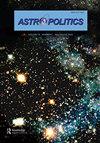Creating a Space Traffic Management System and Potential Geopolitical Opportunities
Q3 Social Sciences
引用次数: 0
Abstract
ABSTRACT When U.S. Space Policy Directive-3 (SPD-3) was released in June 2018, the Trump Administration was addressing a major issue facing the space community, space traffic management (STM). Since its release, there has been limited progress on creating a civil STM system mostly due to U.S. congressional disagreement on department or administration placement. However, after two years the Department of Commerce (DOC) was eventually granted authority and funding to lead U.S. civil STM efforts. Once DOC assumes STM operations from the U.S. Department of Defense (DOD), it offers the United States an opportunity to lead as a space power and gain an advantage in the multipolar strategic space competition. This article begins with a brief history of DOD’s role in space situational awareness, STM, and the culmination point that made DOD want to rid itself of STM responsibilities. The article then discusses two major studies that explored establishing a civil STM agency while identifying issues that the agency would face once created. The article provides an overview of SPD-3 and examines and addresses its objectives. Finally, the article concludes with opportunities a U.S. led STM system can bring in terms of cooperation and the effects it will have on the overall multipolar strategic space competition.创建空间交通管理系统和潜在的地缘政治机遇
2018年6月发布《美国太空政策指令-3》(SPD-3)时,特朗普政府正在解决航天界面临的一个重大问题,即空间交通管理(STM)。自发布以来,建立民用STM系统的进展有限,主要原因是美国国会在部门或行政部门的安排上存在分歧。然而,两年后,商务部(DOC)最终获得了领导美国民事STM工作的权力和资金。一旦DOC承担了美国国防部(DOD)的STM操作,它将为美国提供一个领导空间大国的机会,并在多极战略空间竞争中获得优势。本文首先简要介绍了国防部在空间态势感知(STM)中的作用,以及使国防部希望摆脱STM责任的高潮点。然后,本文讨论了两项主要研究,这些研究探索了建立一个民事STM机构,同时确定了该机构一旦成立将面临的问题。本文概述了SPD-3,并对其目标进行了分析和阐述。最后,文章总结了美国领导的STM系统在合作方面可以带来的机会,以及它将对整体多极战略空间竞争产生的影响。
本文章由计算机程序翻译,如有差异,请以英文原文为准。
求助全文
约1分钟内获得全文
求助全文
来源期刊

Astropolitics
Social Sciences-Political Science and International Relations
CiteScore
1.20
自引率
0.00%
发文量
2
期刊介绍:
Astropolitics: The International Journal of Space Politics and Policy is a peer-reviewed academic journal. The journal is dedicated to policy relevant and interdisciplinary analysis of civil, commercial, military, and intelligence space activities. Committed to the highest editorial standards, Astropolitics is the international journal of choice for the academic, policy-maker and professional in the space community.
 求助内容:
求助内容: 应助结果提醒方式:
应助结果提醒方式:


